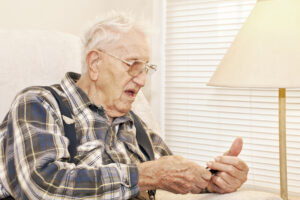A Look Through the Eyes of Someone with Low Vision

Caregivers in Cranford NJ: A Look Through the Eyes of Someone with Low Vision
You wake up in the morning, and you blink your eyes. Everything looks a bit blurry, but that’s normal, right?
Everything is blurry in the morning, for everyone.
The blurriness stays, though, as your daughter, now also your caregiver, helps you into the kitchen for breakfast. The lights seem dimmer in here than they used to be, and you have to squint to see her clearly. You don’t tell her that sometimes you can’t even make out her face anymore, because you don’t want her to worry about you even more than she already does.
A part of you thinks she already knows, though. You can sense her concern when you hand her your recipe cards because you can’t read the writing on the recipe you have been making for forty years, or when you trip over a lump in the carpet that was big enough for anyone else to see, but which you couldn’t see at all.
She startles you when she comes around beside you to place a glass of orange juice on the table. Your peripheral vision has been steadily declining for months now, and now you can hardly see anything unless it is right in front of you. Sometimes, at night, when it gets dark, you can’t see at all. This is the worst part.
You wonder how much worse it can get. You are already fairly certain it won’t get better, because no matter how much stronger the prescription for your eyeglasses gets, they don’t help you to see any better. You wonder if you will trip over something bigger one day, and hurt yourself even worse. You wonder if you should just stay in bed because you can’t see much outside of it anyway.
You wonder if one day you will go fully blind, and you will be trapped in that nighttime darkness forever. If you are the caregiver for an aging loved on with low vision, this could be exactly what they go through every day.
Low vision can’t be helped by glasses or other vision repair techniques, so he or she must find a way to manage their decreased vision, and to live with it. You can help with this by making the house brighter with higher-wattage light bulbs, and by making sure that there are never any toys, shoes, or other debris in the walkway for your loved one to trip over.
You can also help them in other ways, perhaps by rewriting their recipes on bigger sheets of paper, with bolder markers so that they can read them better. Keep in mind, though, that people with low vision don’t just need help seeing – they need emotional support too. Not being able to see well can be scary and disorienting. Knowing that you are there for them, and that you want to understand what they are going through and help them in any way you can could help them to feel less lonely and depressed. Try to see things through their eyes, and ask yourself how you would feel if you were in their place.
If you or an aging loved one are considering caregivers in Cranford, NJ, please contact the caring staff at Care Street Home Care of New Brunswick today. Call (732) 607-8870.
- Encouraging Your Aging Parent to be Healthier - March 7, 2019
- What Can I Serve Seniors with New Dentures? - March 1, 2019
- Join Us for an Engaging Dinner and CEU Presentation! - February 15, 2019
